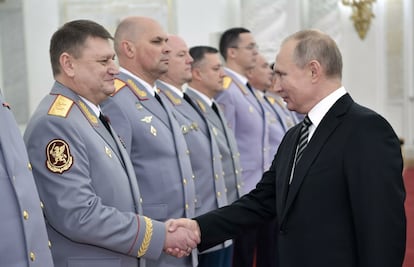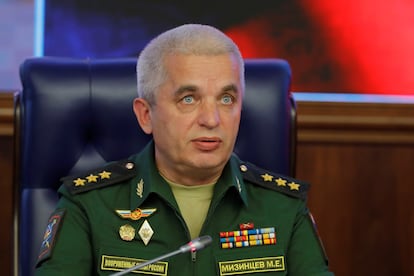Kremlin appoints new logistics chief to address ammunition shortages
General Alexey Kuzmenkov has been installed in place of Mikhail Mizintsev, the ‘Butcher of Mariupol,’ to tackle Moscow’s growing problems in keeping front line troops supplied


The Kremlin has named a successor to Mikhail Mizintsev, known to the Ukrainian military as the “Butcher of Mariupol,” at the head of Russian army logistics. As of last week, Colonel-General Alexey Kuzmenkov has been tasked with overseeing one of Moscow’s biggest challenges in its ongoing war: guaranteeing supplies at the front. Kuzmenkov represents a continuation appointment in his position of deputy minister of defense for logistics, the department responsible for sustaining the Kremlin’s entire military machine. Having previously served as deputy director of the National Guard, Kuzmenkov was appointed at the end of last week by Defense Minister Sergei Shoigu, following the unexpected dismissal of Mizintsev after eight months in his post.
Born in Donetsk, one of the regions in Ukraine illegally annexed by Russia last year, Kuzmenkov has extensive experience in the military rearguard. His appointment is the Kremlin’s answer to one of the most pressing problems facing the Russian army in Ukraine: supplies of ammunition. Even Vladimir Putin has acknowledged the issue and Yevgeny Prigozhin, the head of the mercenary Wagner Group that is heavily involved in front-line operations in Ukraine, periodically complains of a lack of supplies and equipment.
Pro-Kremlin media were quick to link Kuzmenkov’s appointment to the provision of arms to front line troops. “In the course of the military operation, serious problems in material and technical support for the troops have become apparent, which a highly professional manager in this area should solve,” said one of Russia’s oldest newspapers, Komsomolskaya Pravda, upon learning of the Kremlin’s choice as its new chief of logistics.

Among Kuzmenkov’s achievements noted by Russian media was his participation in the plan to swiftly provide armaments and necessary supplies to Russian units deployed in the Syrian civil war, in which the Kremlin began to actively engage in 2015. A graduate of the Volsk Higher Military School of Logistics, Kuzmenkov began his career as an officer in the Russian Ground Forces and continued to rise through the ranks, being appointed Deputy Head of the Resource Support Department in 2011 and Chief of the Logistics Staff of the Russian Armed Forces in 2014.
He was promoted again in 2018 to Deputy Commander of the Forces of the Southern Military District for Material and Technical Supply and a year later was named deputy director of the National Guard, an independent force that answers directly to Putin.
Kuzmenkov was added to the European Union list of sanctioned Russian officials and businessmen in July 2022 following Moscow’s invasion of Ukraine. Among the reasons for his inclusion was that as deputy director of the National Guard, which is responsible for internal security, he was allegedly behind the order to suppress protests against the Russian occupation in Kherson — which has since been liberated — Henichesk, Berdiansk and Mariupol.
He is also suspected of involvement in the alleged killings, rapes and torture of civilians in Bucha at the beginning of the Russian invasion in March 2022, and is accused of ordering the National Guard to arrest Ukrainian citizens and setting up military administrations in the occupied territories, which the EU stated makes Kuzmenkov responsible for “supporting or implementing actions or policies which undermine or threaten the territorial integrity, sovereignty and independence of Ukraine.”
Sign up for our weekly newsletter to get more English-language news coverage from EL PAÍS USA Edition
Tu suscripción se está usando en otro dispositivo
¿Quieres añadir otro usuario a tu suscripción?
Si continúas leyendo en este dispositivo, no se podrá leer en el otro.
FlechaTu suscripción se está usando en otro dispositivo y solo puedes acceder a EL PAÍS desde un dispositivo a la vez.
Si quieres compartir tu cuenta, cambia tu suscripción a la modalidad Premium, así podrás añadir otro usuario. Cada uno accederá con su propia cuenta de email, lo que os permitirá personalizar vuestra experiencia en EL PAÍS.
¿Tienes una suscripción de empresa? Accede aquí para contratar más cuentas.
En el caso de no saber quién está usando tu cuenta, te recomendamos cambiar tu contraseña aquí.
Si decides continuar compartiendo tu cuenta, este mensaje se mostrará en tu dispositivo y en el de la otra persona que está usando tu cuenta de forma indefinida, afectando a tu experiencia de lectura. Puedes consultar aquí los términos y condiciones de la suscripción digital.








































